Incredible But True, Mastemah, Stalker, Torn Hearts, Wolf Manor
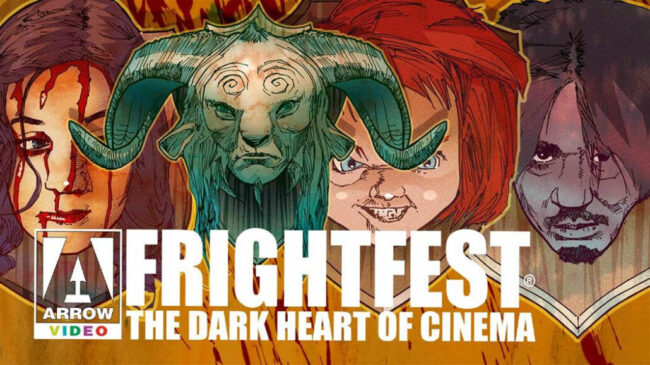
It’s day four! A decent festival so far, with the latest and greatest genre offerings. And this one was looking really stacked. As such, please note that there are some movies I simply didn’t have time to review – they are referenced at the bottom. But let’s not get ahead of ourselves…
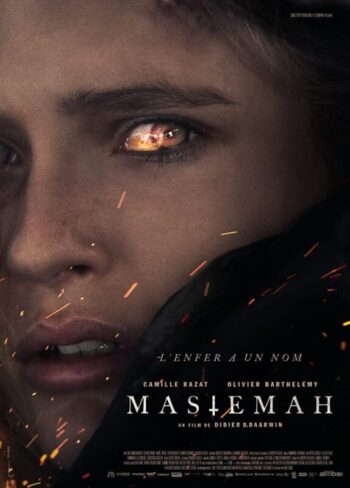
MASTEMAH
Directed by Didier D. Daarwin
We start the morning with a trip to France. I know one shouldn’t judge a book by its cover nor a film by its poster, but the publicity superhero-lite materials didn’t fill me with enthusiasm. Anyway, after a traumatic accidental death during a hypnosis session, Louise, a young psychiatrist, leaves the big city to open a new consultancy in the small village of Aubrac. She’s optimistic about starting again before she meets Theo: a dark and mysterious client who may have schizophrenia or be possessed by the devil. Daarwin embraces the ambiguity of the situation, playing his cards close to his chest for a large part of the running time. Normally I’d applaud this, but it takes Louise so long to ask the main questions posed by the narrative that I found it hard to give a damn about the answers. The audience is always an act ahead – heck, if they’ve googled the title or blurb, they are at the end before it even begins. It’s a movie where the payoff is perpetually right around the corner but never comes. In fact, for large parts the waiting for the inevitable means it’s more like Mastemeh.
Thematically, the idea of a therapist confronting her demons through a client is far from a unique premise. Nor is the devil acting as a metaphor for the darkness that may exist in all of us. As such, it’s extra annoying that this film goes in pretty much the direction you expect it will – at least until a daft development late in the day. So, a very predictable movie with one of the most infuriating endings you can think of (and no, it isn’t all an afterlife fantasy). Neither character is afforded much psychological depth – not good for a move about psychotherapy. Instead, the pain and emptiness the script constantly pays lip service to exist more as abstract ideas than anything concrete. Most of Louise’s life seems to revolve around a single moment for which she is only indirectly responsible. Likewise, Theo’s given almost no backing story and is a Frankenstein’s monster of rural tropes: chopping wood, bathing in waterfalls and eating bread by the hunk.
Dream sequences show potential, particularly an early one that immerses us in a horrific scenario. However, it comes to lean on them too much, and there are few other dramatic scenes aside from an unintentionally funny one involving antidepressants. Of course, it helps that both cast members do a lot with the material – in particular, Theo is an imposing bear of a man, but with gentle eyes. Visually, it’s very accomplished, too – especially for a debut. The wilderness becomes a stylish dreamworld that showcases the director’s time working in adverts and music videos. From the crimson openers, as we drift over the hospital to the beautiful French landscapes, he’s adept at capturing a mood and making everything seem part of something grander. How I wish that had been the case.
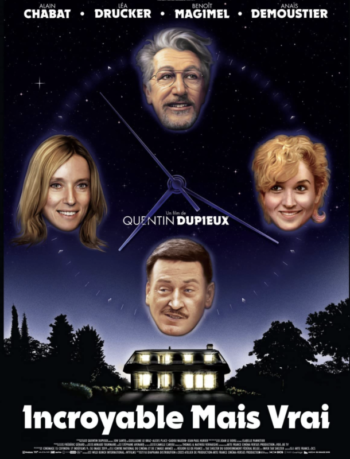
INCREDIBLE BUT TRUE
Directed by Quentin Dupieux
Quentin Dupieux has a weird filmography so far, being the only director to date to do a film about a killer tyre. His latest offering is no exception. In this quirky satire about the humdrum of work and getting old, a pair of middle-aged house hunters, Alaine and Marie, find something life-changing in their latest bargain. In the basement, there’s a manhole, and if one goes down it, two things happen: i) they appear in their kitchen 12 hours forward, and ii) their body de-ages by three days. Meanwhile, in the most awkward dinner sequence since Hereditary, the couple learns that Alaine’s boss has undergone an unusual body modification. It’s a deceptively simple set-up for a surprisingly poignant little sci-fi comedy with a lot of heart. Both Marie and Alain’s boss want to recapture something: artificially striving toward their ideal selves. For her, it is her beauty; for him, it’s virile masculinity to replace his faded glory. This means a carefully balanced sadness underlines much of what we see.
There’s a darker film sitting constantly on the side-line, threatening to overwhelm the one we’re watching. Yet it never quite does. Instead, the jaunty, twee soundtrack and absurdity of the situation mean we never take it too seriously – even when Marie appears to be addicted to going downstairs. For the most part, performances are understated – especially Alain Chabat, who is unimpressed with the weird things going on around him. However, all of them sell the absurdity as if it were normal. A wise choice: I could watch the secret door to the future being explained as a feature and benefit of a two-floor house as if it were a hot tub, all day. It builds to a bittersweet third act, in which an extended montage summarises years in this suburban hell. I could have spent longer there than the short running time allowed – barely lasting 70 minutes. But then, as the movie shows, getting what you want won’t always make you happy. An unexpected delight of a movie and a big step up for the day.
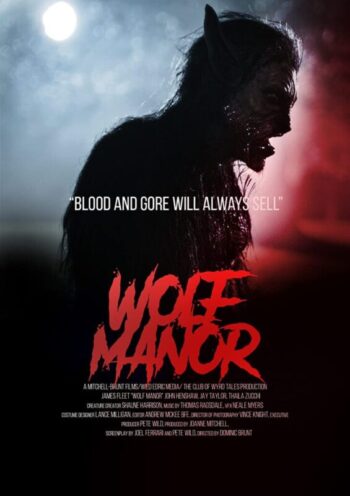
WOLF MANOR
Directed by Dominic Brunt
Dominic Brunt has had a varied career ranging from the grittiness of kitchen sink revenge flick Bait to the sheer stupidity of Attack of the Adult Babies. Not bad for a guy who made his name through Emmerdale. He revisits FrightFest for this slice of comical monster mayhem. A movie crew shoots an indy vampire flick in an abandoned house deep in darkest Shropshire. Little do they know this mansion is home to a werewolf. And it’s a full moon outside. In its best moments, Wolf Manor is played like a slightly absurd Hammer Horror – a sequence at the start where regulars in the local tavern get cagey about the house. However, this is a front-heavy film, with the best bits being in the first half, when the humour comes more from character and situation. The problem is neither gets well developed – a single attribute largely defines the characters, and what plot there is relies on them making terrible decisions to move it ahead.
No small part of this is the ensemble approach and no protagonist, meaning we have a movie of supporting characters in need of someone to rally around. Though they’re not likeable enough to sustain a whole film, and none of them have an especially engaging arc. No lessons are learned, no significant relationships developed – any survivors (and to be fair, it creates an atmosphere where anyone can die) learn nothing from the experience. The lack of development means jokes are repetitive and obvious, with the same ones rolled out constantly. Still, to be fair, the movie knows all this and even has a laugh at its lack of ambition. For example, the script makes fun of how meagre the backing story is (“brief and vague”), and the characters act as if they’re above the material. For instance, theatre-bore Oliver Lawrence reflecting on how he used to play MacBeth. Plaudits to them for working in an interesting distinction between “the talent” and the production crew – something the next film returns to. It also captures how boring film sets are, with lots of waiting, awkward banter, boasting and diva behaviour. The wolf itself looks alright: big, hairy, and imposing. I was glad they went for practical effects rather than dodgy CG (though, unfortunately, they use this for blood). Unfortunately, the ending is underwhelming, which is a shame as the threat was something that had been, for the most part, taken seriously.
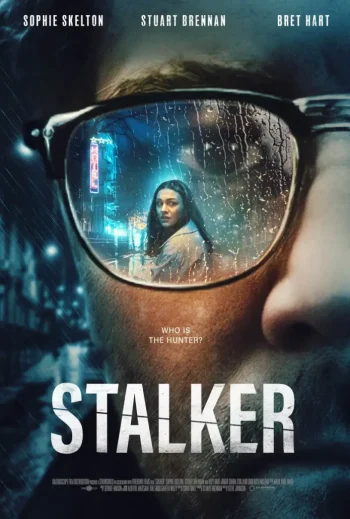
STALKER
Directed by Steve Johnson
It was a tough pick between this and The Price You Pay, but ultimately, I wanted to go for the one with a Bret ‘The Hitman’ Hart cameo over the one with the guy who played Bennett in Commando. A strange decision to be making in 2022. Anyway, I’ve said before that I love chamber horror. And you don’t get any more chamber horror than this: an elevator. Stalker uses that cliché of who you would least like to be stuck in a lift with to clever effect. Rose is a young B-list actor who has just taken on the role of a lifetime after an A-lister went missing. After a long shoot, she returns to her empty, creepy hotel. However, on her way to the thirteenth floor, the freight elevator jolts to a halt, leaving her trapped with an unusual stranger. With no mobile phone signal and a storm brewing, she finds out the guy, Daniel knows her: he’s a camera operator on her latest movie and is seemingly obsessed with her. The dialogue, and their delivery, is mostly naturalistic (although this is lost somewhat as it goes on) and Johnson wrings the situation for tension.
It’s a ten two-hander in which Sophie Skelton and Stuart Brennan fully inhabit their roles. Brennan is remarkably creepy but also vulnerable – shyly speaking to someone several steps higher on the social ladder. Like Wolf Manor before it, Stalker looks at the hierarchies within the movie industry – Rose’s attitudes towards grips being the most glaring example. Daniel’s invisibility, too: he knows her, but she doesn’t know him. I appreciated that she is so much more than a victim. Like lots of the best leads, she isn’t a very nice person: insecure, overly sensitive, and a snob. Skelton plays the part well, finding the different nuances in her. There are welcome moments of connection, where they let down their guards, that almost make you wish you weren’t watching horror since we know it can’t end well for at least one of them. On that front, the premise has a few finales inbuilt, and while I called which one was going to feature very early on, the story beats themselves were good. Unfortunately, we’re given a long-winded explanation, with some unnecessary surrealist imagery, that slightly derails the otherwise enjoyable film. It’s also tricky to sustain interest with such a minimalist set-up across 90 minutes, so a punchier third act may have been more effective. Regardless, it’s a good ride and will leave you wanting to take the stairs next time.

TORN HEARTS
Directed by Brea Grant
FrightFest favourite Brea is back two days after the premiere of Night Sky. Torn Hearts is a Blumhouse picture about two best friends trying to make it big in country music. Taking place in Nashville’s busy scene, we follow Leigh and Jordan, the lead singer and songwriter, respectively (this is a crucial dynamic). We find them angling for a spot with a more successful country-pop star who only tells them he’s not interested in touring with them. Instead, he wants an all-guys show – something he only says after he and Jordan have done the beast with two backs. Down on their luck, and resenting the closed boy’s club, the two women go to find their idol for help: a reclusive country legend named Harper Dutch, who lost her singing partner some time ago. Luckily, she’s willing to help them, but only at a cost. At first glance, this probably doesn’t sound brilliant: a deal with the devil style movie about a genre of music most people over here don’t listen to let alone like. But perhaps the best thing about Torn Hearts is how well it develops tensions between the three leading ladies.
Katie Sagal is horrific as Harper Dutch: rude, arrogant, and manipulative. It’s a glorious return to “hagsploitation”. And while everyone has ulterior motives for being there, she knows and embraces the power she has over her two admirers. On them, Alexxis Lemire and Abby Quinn are both brilliant performers who share a very natural chemistry. Their friendship is convincing, which makes their conflicts harder to watch. The heart and soul of the film are whether they will let Harper’s mind games come between them. Grant does a great job handling the story – this is a movie where not a lot of physical things happen in the second half, and the threat Harper poses is psychological. Yet she keeps it going at a brisk pace and visually interesting. Still, it’s an oddly restrained movie that fails to embrace the campness of its situation and the industry it is about – keeping things more real than I think is necessary. At times, Rachel Koller Croft’s script seems to push it more in this direction, making the third act’s muted tone a curious creative choice. Still, this is a compelling and enjoyable insight into the country industry. And yet another accomplished small-scale horror from a festival specialising in them.
I also saw…
Control: Repetitive and predictable sci-fi which does not do a lot with an interesting premise.
Swallowed: Intriguing and inclusive LGBT+ body horror that eventually outstays its welcome.




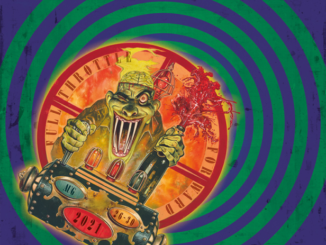
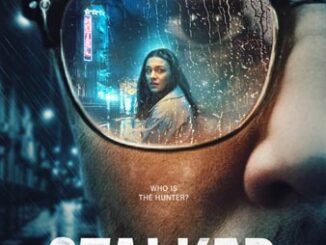

Be the first to comment